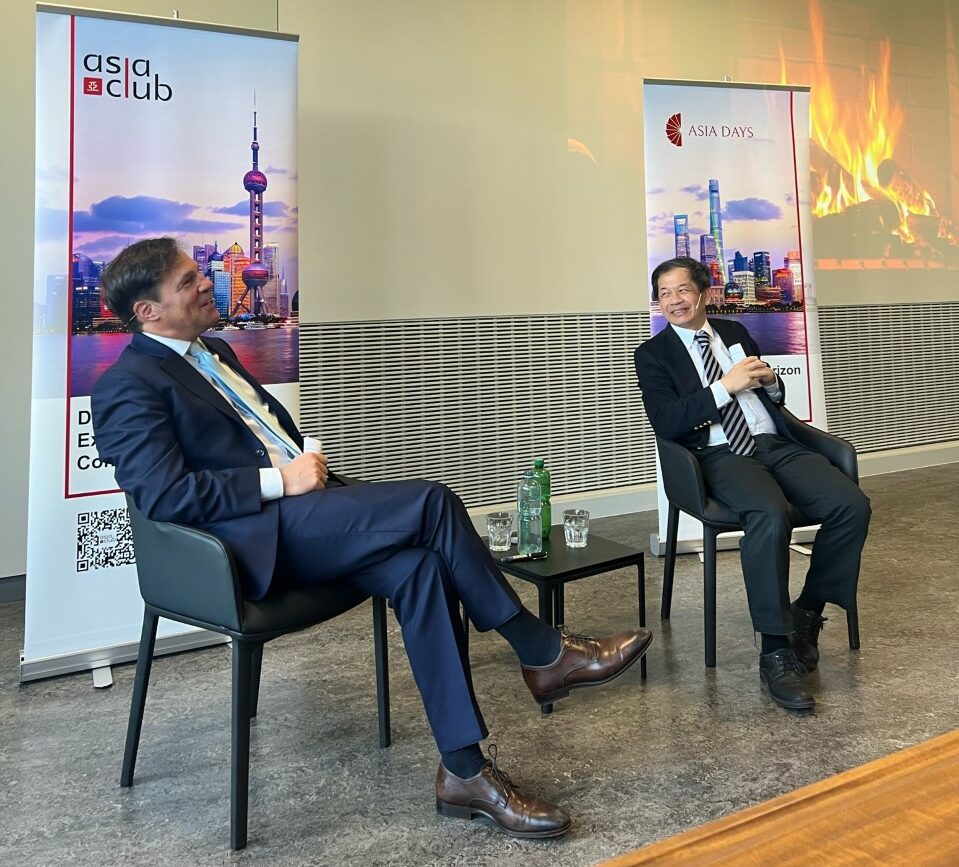Having a chat with Taiwan’s Trade representative
Dr. David W. F. Huang, Taiwan’s trade representative to Switzerland, visited the University of St.Gallen on March 9th during the Asia Days. Prof. Dr. Christoph Frei, professor for political science at our university, had the opportunity to discuss major topics concerning Taiwan’s political and economic situation with the Oxford and MIT graduate during a one-hour fireside chat.
Starting with a light question about his opinion on Switzerland, Dr. Huang answered that he was privileged to be sent here. After calling Switzerland „heaven on earth” with beautiful scenery, he proceeded to mention how it has a lot to teach Taiwan. Everything here moves step by step but with the danger of becoming too rigid. In contrast, Taiwan’s strengths include its nice food, kind people, and fast-paced life. Dr. Huang noted that both Taiwan and Switzerland have a lot to learn from each other, and „no model is better than the other”; they work differently.
The discussion then turned to the economic relationship between Switzerland and Taiwan, which is amicable yet distant. Dr. Huang noted that both share similar values and have open economies, but are too far away from each other to engage in a closer connection. Prof. Frei added that Switzerland’s neutrality also hinders a closer relationship with regards to the current situation, tickling the elephant in the room.
When asked about Taiwan’s political landscape, Dr. Huang emphasized that it is a liberal democracy with competitive elections and a robust civil society. However, he acknowledged that the country’s democracy is not perfect and that there are misinformation campaigns through major media outlets and a vigorous opposition party.
Prof. Frei then asked about the social fragmentation and polarization that is currently a concern in Europe and whether Taiwan experiences similar issues, to which the Taiwanese representative responded in a diplomatic manner: the major dispute in Taiwan is over independence, with some people supporting unification with China and others advocating for independence. Still, he emphasized the core of Taiwan’s national identity being based on its constitutional identity rather than its ethnic identity.
The discussion then turned to Taiwan’s dependence on imports for energy and food, as well as the need to maintain the economy and follow international trade rules. Dr. Huang noted that the economy is strongly dependent on Chinese markets, which is a concern for many Taiwanese businesses. He stressed the need to diversify the economy and reduce dependence on China. It is easy to invest in China, but practically impossible to take out the investments after said investments were successful.
Finally, the relationship between China and Taiwan was addressed: Dr. Huang stated that the biggest concerns in Taiwan right now are their dependent economy and the Chinese threat. He stressed the importance of considering stakeholders in decision-making and that development takes time because everyone needs to be considered. He cited Taiwan’s zero-COVID policy as an example. He expressed hope that things will improve between Taiwan and China and that threatening Taiwan is not acceptable. When the question about unification with China or independence came up, Dr. Huang explained that the status quo is that Taiwan and China are two separate entities (with the same ancestors) and that there is no need to declare independence.
Overall, the Fireside Chat with Taiwan’s trade representative to Switzerland provided valuable insights into Taiwan’s cultural, economic, and political landscape. It highlighted the importance of national identity and the importance of peaceful cooperation with the rest of the world.



